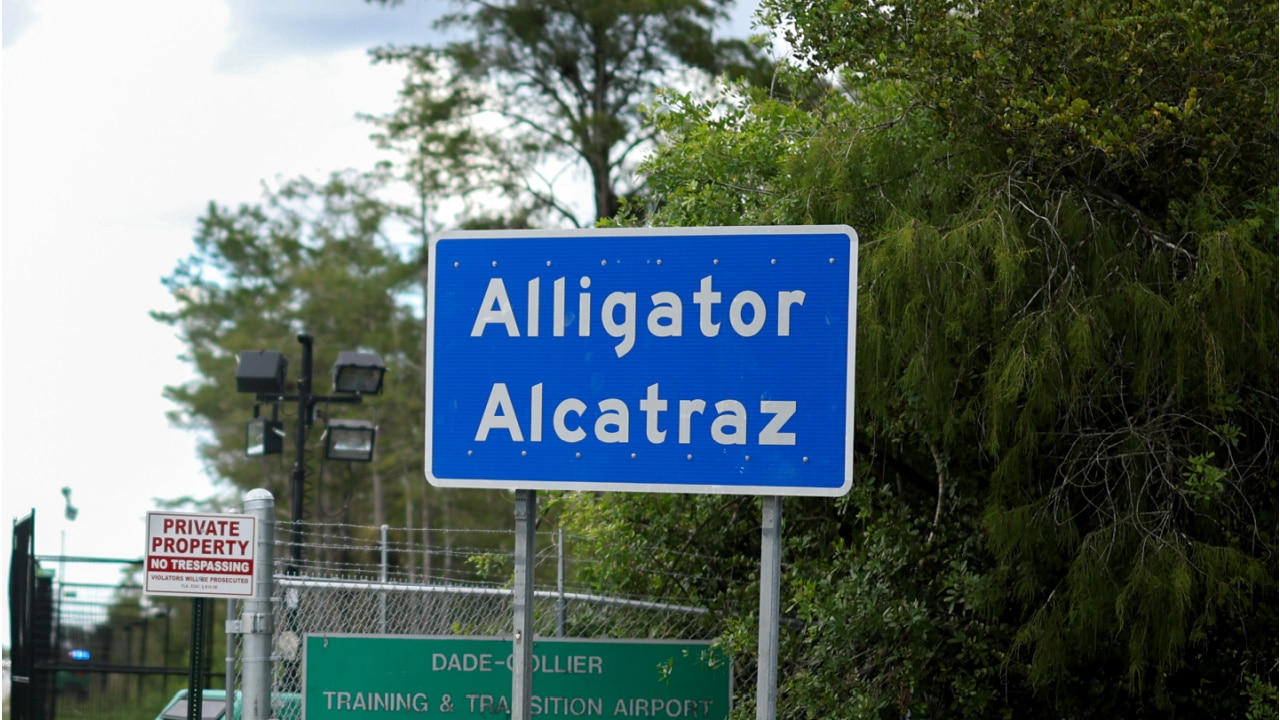
Hunger Strike at ‘Alligator Alcatraz’ Enters 11th Day as Detainees Protest Inhumane Conditions
The Florida immigration detention center known as “Alligator Alcatraz” has been at the center of growing national outrage. For over ten days, detainees have refused food, launching a hunger strike to protest what they call inhumane conditions. The center, a state-run facility built rapidly on an old airstrip in the Florida Everglades, has come under fire for alleged unsanitary conditions, lack of access to legal counsel, and human rights violations.
Pedro Hernández, a Cuban man ICE detained during a routine check-in in July, was hospitalized during the strike. He continues to refuse food.
“We’ve all been hungry since Tuesday. I’m not going to eat another plate of food until they show us respect,” he said in a recorded phone call from inside the facility, according to NBC News.
His wife, Daimarys Hernández, told NBC6 she fears for his life. “My husband was in prison. We make mistakes, but we learn from them and fix things,” she said. “I’m terrified he could die in custody, or [they could deport him] back to Cuba, alone.”
Why the Alligator Alcatraz hunger strike started
Detainees say the strike began on July 22 in response to unsanitary and unsafe conditions. Pedro Lorenzo Concepción, also identified as Pedro Hernández, said in a phone call with El País, “I feel weak, with a lot of heartburn.” He added, “I don’t want food, I refuse any treatment. I didn’t even ask to be taken to the hospital, because I’m fighting for my family and all Cubans, and I belong where my people are, in prison, suffering the same hardship they are.”
According to The Independent, Concepción collapsed multiple times and officials transferred him to Kendall Hospital in Miami. There, he sat in handcuffs as doctors tried to feed him. He refused.
Life inside Alligator Alcatraz, according to detainees
Leamsy “La Figura” Izquierdo, a Cuban artist and former detainee, described horrific conditions to CBS News. “They only brought a meal once a day, and it has maggots,” he said. “They never turn off the lights for 24 hours. The mosquitoes are as big as elephants.”
Thomas Kennedy, a policy analyst with the Florida Immigration Coalition, wrote on X that detainees “have had to remove fecal matter from the toilets with their bare hands because the toilets lose pressure due to lack of water.” He added, “That’s the sort of depraved conditions that drove those in detention there to ten days of hunger strike so far.”
Officials deny there’s a hunger strike
Despite mounting evidence, the Department of Homeland Security (DHS) denies the strike is happening. “FALSE. There is no hunger strike at Alligator Alcatraz,” a senior DHS official told Newsweek in an email statement. “Unfortunately, this isn’t the first time, nor will it be the last, that the media repeats unsubstantiated, inaccurate allegations about illegal alien detention facilities.”
The statement added, “During hunger strikes, ICE continues to provide three meals a day, delivered to the detained alien’s room, and an adequate supply of drinking water or other beverages.”
So far in 2025, there have been 10 confirmed deaths in ICE detention, according to the agency. Eunice Cho, a senior staff attorney at the ACLU National Prison Project, told Newsweek in July, “These deaths are clearly attributable to the Trump administration’s increased and aggressive detention policies… these deaths were likely preventable.”
Community outrage is growing over Alligator Alcatraz
On July 22, community members and Democratic leaders gathered in Coconut Grove for an emergency town hall, demanding reform and accountability. “Florida has struck an unholy bargain with the Trump administration,” one speaker said, according to NBC News. “People are not getting food, hygiene, or medical care. These conditions are substandard and cause irreparable harm.”
Florida Representative Maxwell Alejandro Frost wrote in an X post, “438 veterans in Florida are taking a stand against the unconstitutional and illegal use of our military for immigration enforcement. I stand with them. We should be defending our nation, not using Marines to cage people.”
As deportation flights begin, detainees face grim choices
Deportation flights from Alligator Alcatraz started in late July and are expected to continue. According to Newsweek, the facility costs Florida an estimated $450 million a year to operate and was designed to hold up to 1,000 detainees.
However, earlier reports by local outlets found that only about a third of detainees at the facility had a criminal record, despite officials claiming it would house the “worst of the worst.”
Pedro Concepción’s wife, Daimarys, said she fears her husband could be deported alone, leaving behind her and their two children. “In a minute, your life falls apart,” she told The Independent. “It’s been 19 years of being together.”
The lawsuits against the facility are mounting, with civil rights and environmental groups accusing state officials of building and operating the facility under unconstitutional and inhumane practices.
Whether or not DHS acknowledges the hunger strike, detainees say they are risking their lives to be heard.




